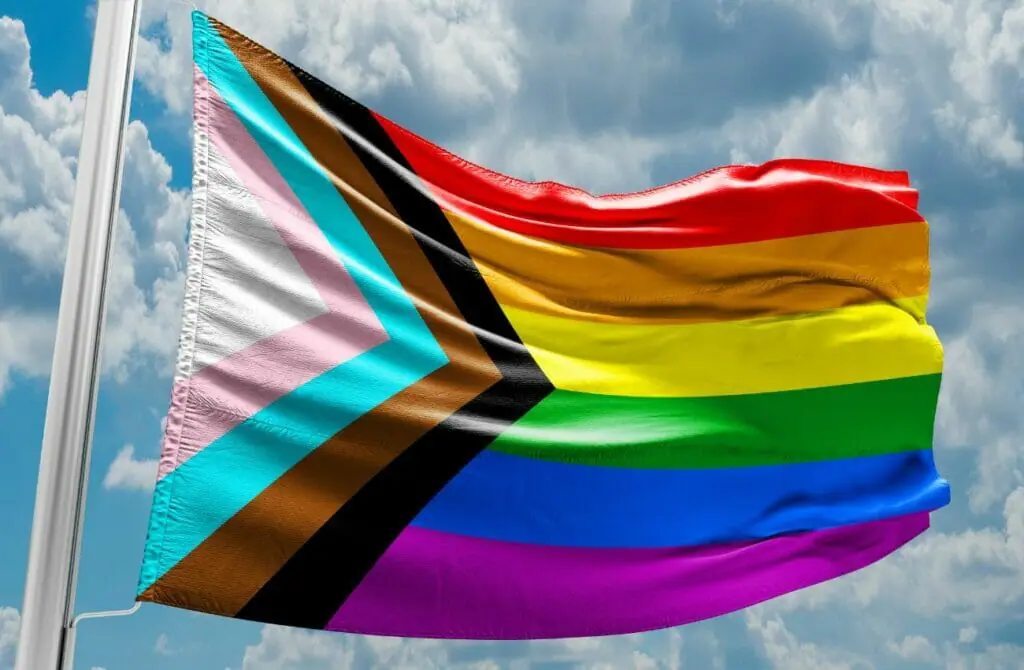South Africa stands as a beacon of progress in terms of LGBT rights on the African continent. With a history of diversity and a constitution that guarantees equal rights and protections, the country is known for its liberal attitudes toward the LGBT community.
Same-sex marriage has been legalized in South Africa, and discrimination based on sexual orientation and gender identity is constitutionally prohibited, making it an inclusive environment for both locals and tourists alike.
However, it is important to remain cautious and vigilant while traveling, as situations can change rapidly, and some individuals may still harbor prejudiced attitudes. To ensure maximum safety, visitors are encouraged to stay updated on current travel advice and remain respectful of local customs and laws. In case of need for assistance or support, one can turn to several local LGBT advocacy groups dedicated to promoting and protecting the rights of the community.
As you explore the vibrant and diverse country of South Africa, let excitement guide your experience, but always be mindful of the ever-changing landscape of LGBT rights. Connecting with advocacy groups and keeping yourself informed can offer a secure and knowledge-backed trip, allowing you to truly appreciate all that this progressive nation has to offer.
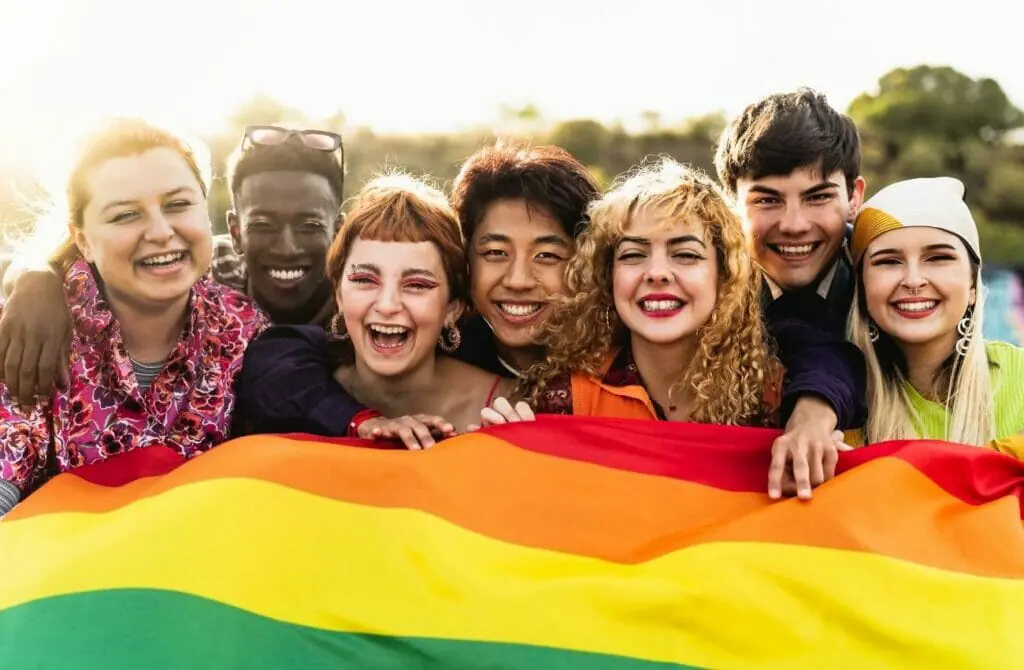
History Of LGBT Rights In South Africa
South Africa has a remarkable history when it comes to LGBT rights. Post-apartheid, the country adopted the first constitution in the world to explicitly outlaw discrimination based on sexual orientation in May 1996. This milestone put South Africa ahead of many other countries in terms of legal protections for the LGBT community.
As the only sub-Saharan African country that permits same-sex relationships, South Africa stands out in the region. It was the fifth country in the world to legalize same-sex marriage, making it a trailblazer on the continent. To this day, it remains the only African country with legalized same-sex marriage.
While these progressive laws provide significant protection to local LGBT individuals, it’s essential for travelers to be aware of the nuances in local attitudes. South Africa is a diverse country, and acceptance of LGBT people can vary depending on the region and cultural background. Tourists should always be vigilant and exercise caution when expressing their sexuality in public.
Given that situations can change rapidly, it’s crucial to seek up-to-date information before traveling. Additionally, remain aware of the presence of bad actors who may seek to exploit the vulnerabilities of LGBT individuals, regardless of the country’s progressive legislation.
In South Africa, several notable LGBT advocacy groups are working to further improve the rights and well-being of the community. Connecting with these organizations and staying informed about the local LGBT landscape can help ensure a safer and more fulfilling visit to the country.
Just as enthusiasm about South Africa’s achievements in the area of LGBT rights is justified, travelers and locals alike should remain conscious of potential risks and challenges. Let South Africa’s exciting journey towards greater equality inspire you while never forgetting the need for vigilance and awareness in every corner of the globe.
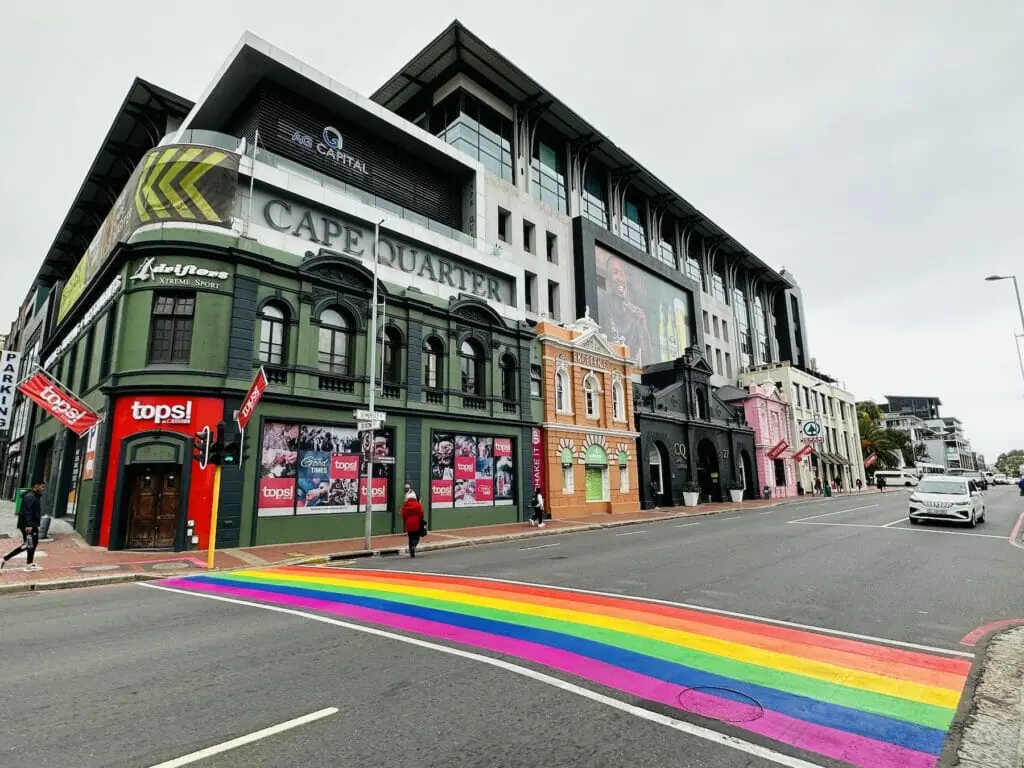
The LGBT Legal Situation In South Africa
In South Africa, the legal situation for LGBT rights is progressive, as the country’s post-apartheid Constitution became the first in the world to outlaw discrimination based on sexual orientation. Furthermore, South Africa stands out as the only African country to have legalized same-sex marriage.
While the legal framework is supportive of LGBT individuals, both locals and tourists should remain aware that discrimination, stigma, and violence can still occur. It’s essential to stay vigilant, as situations can change rapidly, and information may become outdated. It’s recommended to seek current advice before traveling and reaching out to relevant LGBT advocacy groups for the most recent updates and support.
For travelers, there are steps that can be taken to protect oneself in South Africa. Familiarize yourself with local customs and attitudes towards the LGBT community and maintain discretion in more conservative areas. Public displays of affection might be met with hostility, so it’s crucial to gauge the accepted social norms in each location you visit.
In addition to being cautious, connecting with local LGBT communities and advocacy groups such as the Triangle Project, GALA (Gay and Lesbian Memory in Action), and Iranti can help you stay informed and safe while exploring this vibrant and diverse country. By engaging with these groups, you’ll have the opportunity to learn about the most current events and activities, as well as how to navigate potential challenges.
Remember, every country has its unique set of dynamics, and South Africa is no exception. The legal situation may be progressive, but staying informed, cautious, and connected with supportive communities will allow you to experience this fascinating country while minimizing potential risks.
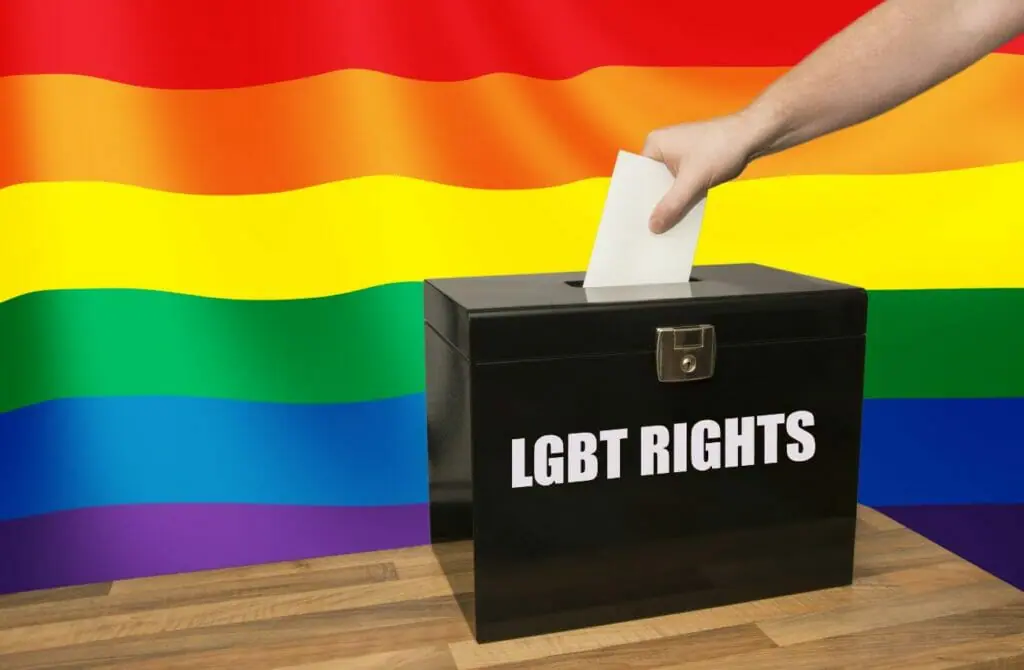

The LGBT Social Situation In South Africa
In South Africa, LGBT people enjoy the same legal rights as non-LGBT individuals, and the country has a unique history when it comes to LGBT rights. South Africa was the first nation in the world to protect against discrimination based on sexual orientation and the fifth to legalize same-sex marriage. However, the social situation is not as progressive as the legal framework.
LGBT locals and tourists alike can face challenges, as 39 percent of the LGBT community has experienced verbal insults, and 20 percent have been physically assaulted, according to a survey from Out, a South African rights organization. Though South Africa is a leader in Africa for LGBT rights, the situation on the ground can be quite different, and vigilance is necessary for everyone.
Safety is crucial for LGBT travelers, and seeking current advice before traveling is highly recommended. Situations can change rapidly, and the information given here may be outdated. The local LGBT community can be an excellent resource for up-to-date information and support.
There are several steps that LGBT individuals, including tourists, can take to protect themselves when visiting South Africa:
- Connect with local LGBT advocacy groups to learn about the current situation and safe spaces or events. Examples of such groups include the International Bar Association and Out, the South African rights organization.
- Avoid displaying excessive public affection, particularly in rural areas or conservative neighborhoods.
- Stay aware of potential bad actors and avoid risky situations.
In conclusion, South Africa has made significant progress in terms of legal rights for the LGBT community. However, the social situation still needs improvement. By staying informed, connecting with local resources, and practicing vigilance, LGBT individuals can enjoy a safer and more enjoyable experience in South Africa. Remember, situations can change quickly, so always be prepared and seek up-to-date advice.
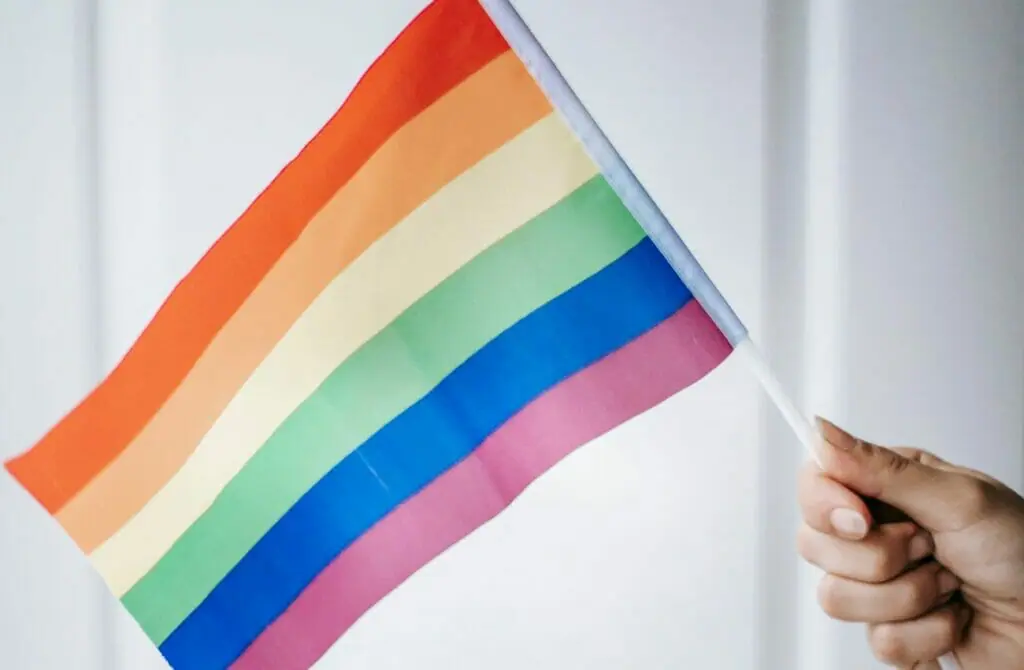
Trans Rights In South Africa
In South Africa, the transgender community enjoys the same legal rights as non-LGBT people. The Bill of Rights, found in the Constitution of the Republic of South Africa, guarantees equality and prohibits unfair discrimination on several grounds, including gender, sex, and sexual orientation.
For both locals and tourists, this legal protection means that transgender individuals have the support of the government in terms of their rights. However, it’s important to note that actual experiences can still vary, as situations can change rapidly, and there are bad actors everywhere. To ensure your safety, remain vigilant and stay informed about current conditions.
Some steps that could be taken to protect yourself, if necessary, include seeking advice from local LGBT advocacy groups and researching the latest information on LGBT rights in South Africa. Additionally, stay connected with the global community through forums and social media platforms focused on transgender rights, as this will provide valuable insights and support.
While the South African government has made progress in ensuring the rights of LGBT people are respected and promoted, always err on the side of caution and be aware that circumstances can change. Before traveling, seek up-to-date advice and information on the current situation for transgender people in South Africa.
Finally, stay informed about the work and resources provided by relevant LGBT advocacy groups, such as the Human Rights Watch and local South African organizations. These groups are continuously working to promote and protect transgender rights, making it essential to stay connected with their efforts.


The Future For The Queer Community In South Africa
As the leader in LGBT rights on the African continent, South Africa has come a long way in terms of marriage equality and legal protection against discrimination. However, challenges remain with regard to further advancements in LGBT rights for both local people and tourists.
Positive steps have been taken in South Africa to protect the rights of the LGBT community, with the nation being the first to include protection against discrimination based on sexual orientation in its post-apartheid Constitution and the fifth country worldwide to legalize same-sex marriage. These advancements provide a strong foundation for further progress and serve as a beacon of hope for LGBT individuals in Africa.
Travelers, both LGBT and allies, should remain cautious and vigilant, for situations can change quickly, and bad actors might be present in any country. Information can become outdated rapidly, so seeking current advice before embarking on a journey is essential. In the interest of safety, being aware of the local climate and consulting local LGBT advocacy groups for the most up-to-date information is advisable.
Numerous LGBT advocacy groups in South Africa work tirelessly to support and advance the rights of the community. These organizations provide resources, education, and support to make a significant difference in the lives of LGBT individuals, both in South Africa and throughout Africa.
In conclusion, the future of LGBT rights in South Africa is exciting, promising, and an example for other African nations. Continued progress and advocacy will not only benefit locals but also create a safer and more inclusive experience for tourists. By staying informed, vigilant, and responsible, everyone can contribute to making South Africa a shining beacon of LGBT rights and progress on the African continent.
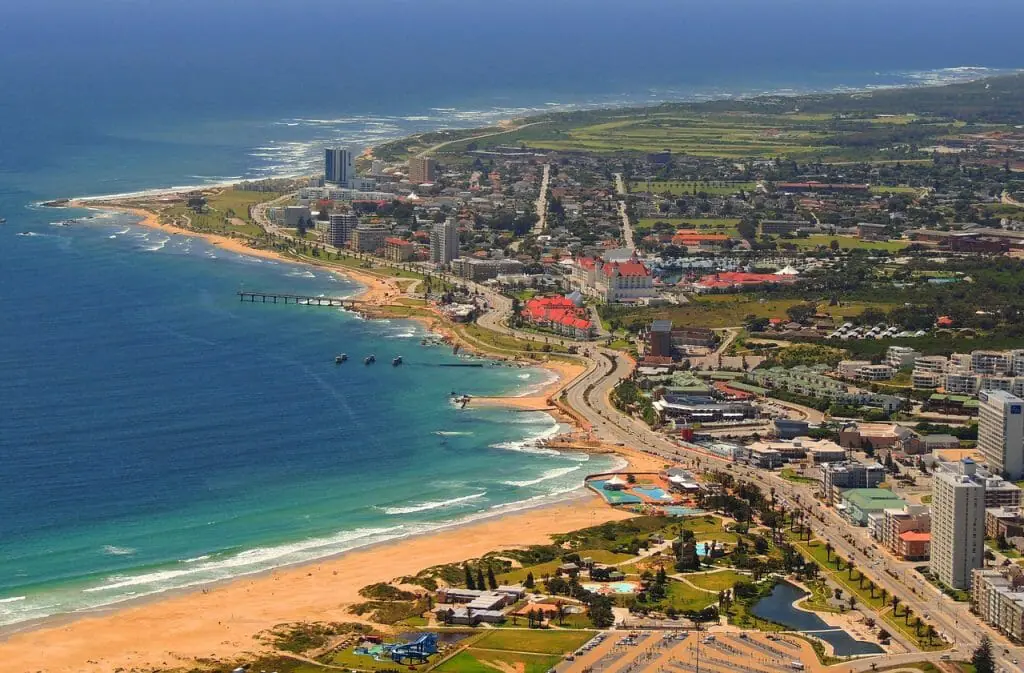
Protect Yourself While Travelling In Gay South Africa
Although South Africa is one of the few African countries that recognizes and protects the rights of LGBT individuals, it is important to remain cautious and vigilant. For both locals and tourists, knowing your rights and staying informed can help protect you in any situation.
In South Africa, discrimination based on sexual orientation is outlawed, thanks to the South African Constitution’s section 9 (3). Still, it’s crucial to remember that not everyone abides by these regulations, and bad actors can be found in any country. With this in mind, always remain vigilant and aware of your surroundings.
If you ever feel unsafe or need help, reach out to local LGBT advocacy groups, such as OUT LGBT Well-being. Established in 1994, this organization provides support for those in the community and works tirelessly to promote an inclusive environment.
Remember that situations can change quickly, and information can become outdated, so always seek current advice before traveling. If you are an LGBT individual planning a trip to South Africa or anywhere else, be sure to research current events and local sentiments before embarking on your journey.
Stay excited about the progress South Africa has made regarding LGBT rights, but never forget the importance of exercising caution and staying well-informed! Happy travels!
